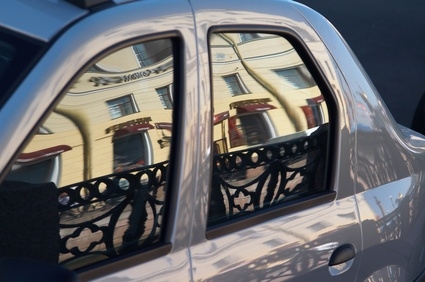
Aftermarket car window tinting is legal in North Carolina. Non-windshield windows may not be any darker than 35 percent visible light transmission. Windshields may also be tinted, but they may not be less than 32 percent visible light transmission. Windshield tint can't extend more than five inches from the top of the windshield or below the AS1 line of the windshield, depending on which one is longer. The AS1 line is a border on the windshield, beyond which you can't tint; the line is placed so nothing impairs the driver's vision.
During a car's safety inspection, which is required by law, the North Carolina Department of Motor Vehicles (NC DMV) will look at tinted windows with a photometer. You will pay an additional $10 fee on top of the standard $27.20 safety inspection fee to make sure the window tint is within regulation.
Every vehicle must abide by North Carolina's tinting laws on the windshield. However, a number of vehicles are exempt from the tinting restrictions for the other windows. Windows for sightseeing and tour passenger vehicles; for-hire vehicles such as taxis; and common-carrier passenger vehicles, motor homes, ambulances, property-moving vehicles, limos and law enforcement vehicles are free from the 35 percent visible light transmission rule. A multipurpose vehicle, such as a minivan or pickup truck, is meant to carry 10 passengers or fewer and is built on a truck chassis or has special features for occasional off-road use. Multipurpose vehicles may be exempt from North Carolina tinting laws as well.
If a driver of standard passenger vehicle has a medical condition that makes him sensitive to light, he can get a medical exception permit from the NC DMV, allowing him to have darker tint on his window. To get this permit, the applicant must apply in writing to the Drivers Medical Evaluation Program and have his doctor fill out medical paperwork from the DMV. This permit is valid for five years unless shortened by the Drivers Medical Evaluation Program. A renewal requires medical recertification to prove the driver still has a medical condition that requires darker window tinting.
You cannot get more than two valid medical exception permits at once. The permit must detail which vehicle it applies to, which windows may be tinted and the levels of tinting. The exception permit is to be carried in the vehicle when it's driven on the highway. Place the NC DMV-issued medical exception sticker on the lower-left hand corner of the rear window. If the sticker isn't displayed, you may pay a $200 fine.